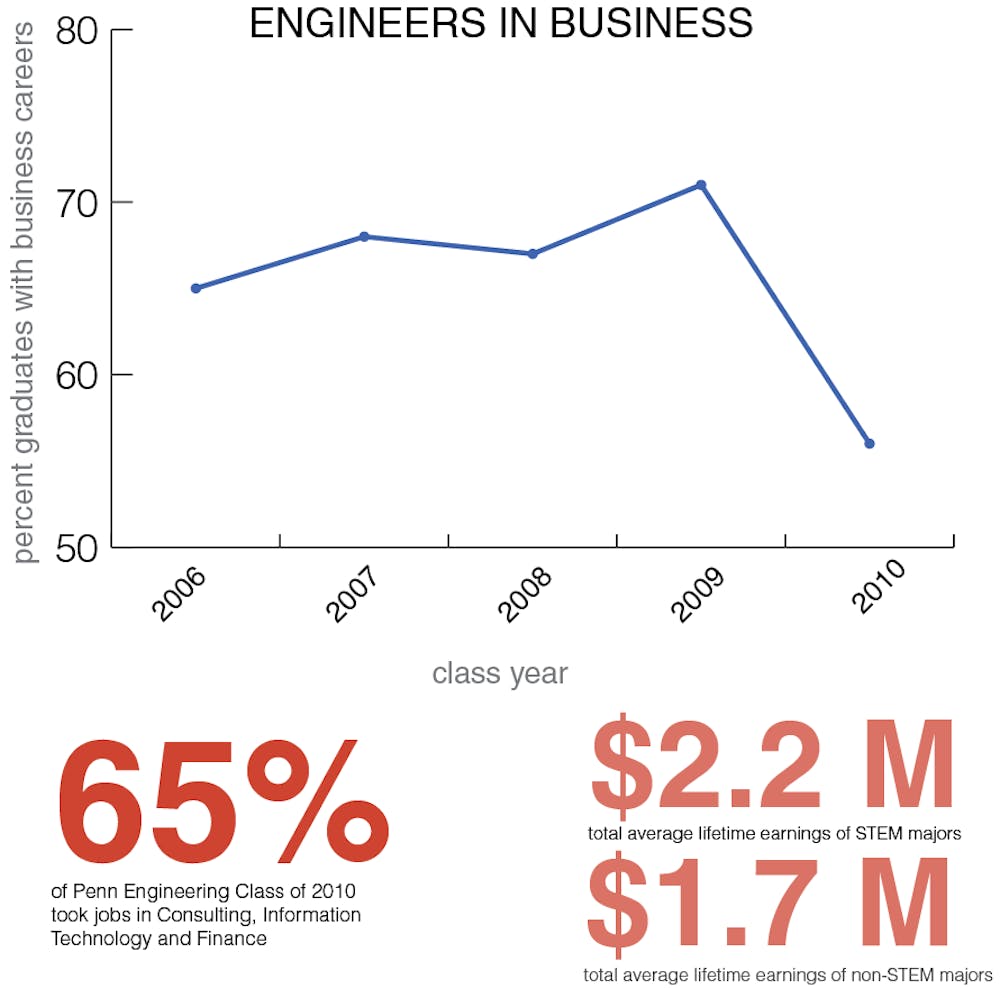Less than one half of undergraduates with engineering or science majors pursue a career in the field of science, according to a Georgetown University study published last month.
This is also true at Penn, where science majors rarely become scientists upon graduation, Director of Career Services Patricia Rose said.
The Georgetown report found that while 19 percent of undergraduates major in science, technology, engineering or mathematics, only 8 percent are working in STEM occupations 10 years after graduation.
Some believe that STEM majors are attracted to business by the higher salaries in this field.
“So many of the opportunities for scientists are not well-funded,” Rose said. “Other industries do a better job at recruiting and pay.”
Last year, less than a quarter of Penn’s Engineering graduates went into engineering, while 52 percent went into jobs in consulting, information technology and finance-investment analysis, according to Career Services.
“It’s a problem when people complete these majors and opt out of those careers,” Rose said. She believes that this trend is similar at other Ivies.
“If a certain population of students are attracted by a salary and if the highest compensation goes to people in business, then that’s what they’re going to want to do,” Rose said.
She added that many on-campus recruiters look for engineers to join their companies.
“Engineering students and science students have strong quantitative skills,” Rose said, adding that banks and consulting firms do a good job at recruiting at colleges.
“At the beginning of the year, there is unquestionably a stronger presence on campus of business recruiting,” Engineering senior Casey Gelber said.
Gelber, who is studying bioengineering, said her peers are “drawn to business and consulting jobs due to the appeal of having a job earlier on in the school year, the benefits of the locations in which business and consulting jobs are located, along with the additional salary that is probably involved.”
“Smaller engineering or science research companies might only know of job openings closer to the job’s start date, and therefore will recruit later in the year,” she added.
Many Engineering students say that their undergraduate education gives them a springboard to many fields.
“The great part about Penn Engineering is that it has a flexible curriculum,” said Engineering senior Kelsey Brown, who plans to work for Deloitte Consulting next year as a business technology analyst. “Other engineering schools do not provide such flexibility.”
At Penn, there is a “focus on interdiciplinary learning” which allows for engineers to enter other fields such as business, medicine, and health care, Engineering sophomore Shivali Khetan said.
However, while some students don’t use their scientific knowledge in business jobs, others enter fields such as technology consulting where business and science intersect, Brown said.
“Even though I don’t want to be an engineer, I like the technology aspect that my engineering background has fostered and I hope to utilize that in business technology solutions going forward,” Engineering senior Nitin Puri wrote in an email.
“I still want to work with technology and solve problems but also work with clients and in a team setting,” Brown agreed. “I don’t want to solve engineering problems all day.”



